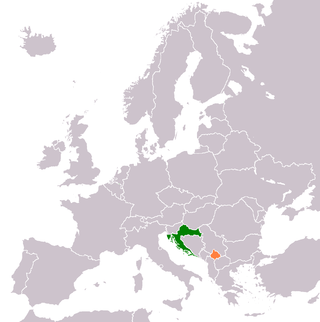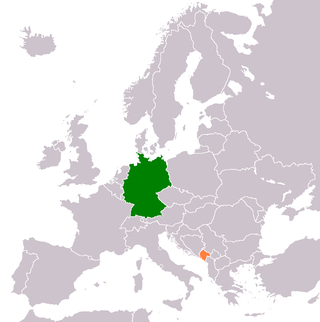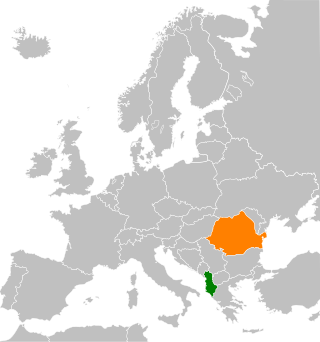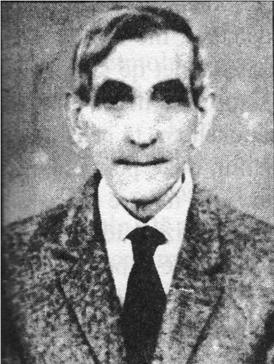
Omer Nishani was an Albanian medical doctor and political figure involved first in the struggle against Ahmet Zogu in the 1920s and 1930s, and then in the struggle against the fascist occupation of Albania during the 1942–44 period, becoming Chairman of the Presidium of the People's Assembly of the People's Republic of Albania in 1946 and serving in this position until 1953.

The South-East European Cooperation Process (SEECP) was launched on Bulgaria's initiative in 1996. At the Bulgaria-chaired meeting in Sofia, the Southeast Europe (SEE) countries laid the foundations for regional co-operation for the purposes of creating an atmosphere of trust, good neighbourly relations and stability.

Diplomatic relations between Croatia and the United States were established on April 7, 1992 following Croatia's independence from Yugoslavia. The mutual relations continue to be cordial, friendly, and very close.

Croatia–Kosovo relations refer to the bilateral relations of Croatia and Kosovo. Diplomatic relations among two countries were established on 30 June 2008, following Kosovo's declaration of independence. Croatia has an embassy in Pristina, and Kosovo has an embassy in Zagreb. Both countries were part of Yugoslavia from 1918 to 1991. Relations between the two countries are described as very good and friendly.

German-Montenegrin relations are foreign relations between Germany and Montenegro. Both countries established diplomatic relations on 14 June 2006. Germany has an embassy in Podgorica. Montenegro has an embassy in Berlin and a general consulate in Frankfurt. Both countries are members of Council of Europe and NATO. Also Germany is an EU member and Montenegro is an EU candidate. In 1997 the German Bundeswehr used the Podgorica Airport for the Operation Libelle, which led to the first skirmish involving German forces since World War II.

The accession of Albania to NATO took place in 2009. Albania's relationship with the North Atlantic Treaty Organization (NATO) began in 1992 when it joined the North Atlantic Cooperation Council. In 1994, it entered NATO's Partnership for Peace, which began Albania's process of accession into the alliance. In 1999, the country received a Membership Action Plan (MAP). The country received an invitation to join at the 2008 Bucharest Summit and became a full member on April 1, 2009.
Arbanasi is an ethnic community in and around the city of Zadar region in northern Dalmatia region of Croatia who are of Albanian ethnic origin. They are traditional speakers of the Arbanasi dialect of Gheg Albanian. Their name is an obsolete way to say Albanians in Croatian and is the toponymy of the first Arbanasi settlement in the region, which today is a suburb of Zadar. In Albanian literature, they are known as "Albanians of Zadar".

Bujar Faik Nishani was an Albanian politician. He served as the president of Albania from 24 July 2012 to 24 July 2017.
The Albanians of Croatia are people of full or partial Albanian ancestry and heritage who are an ethnic minority in Croatia.
The Autonomous study program for teacher training in Albanian language is an autonomous study program of the University of Montenegro in Podgorica.

Albania has an embassy in Bucharest and Romania an embassy in Tirana and a consulate in Korçë. On 16 December 2013, a celebration was held in Romania celebrating the hundredth anniversary of the establishment of diplomatic relations between the two nations.

Tahir Nasuf Dizdari was an Albanian orientalist, folklorist, and scholar. He was the main orientalist in Albania, and contributed in identifying and studying oriental words borrowed from Albanian.

Albania has an embassy in Rome and two general consulates in Bari and Milan. Italy has an embassy in Tirana and a general consulate in Vlorë.

The National Flag Decoration is one of the highest decorations to be given in Albania, among the Civil awards and decorations of Albania, and was instituted by special law Nr.8113, of 28 March 1996.

Albania has an embassy in Lisbon and 3 honorary consulates in Porto, Funchal and in the island of Madeira. Portugal has an honorary consulate in Tirana. The history of diplomatic relations of Albania and Portugal dates back to 1922, when Portugal recognized Albania's independence on May 25, 1922.

Bajram Begaj is an Albanian politician and retired military officer, who is currently serving as the president of Albania since 24 July 2022. Having had a long career in the Albanian army, he served as the 26th Chief of General Staff of the Albanian Armed Forces from July 2020 to June 2022.



















